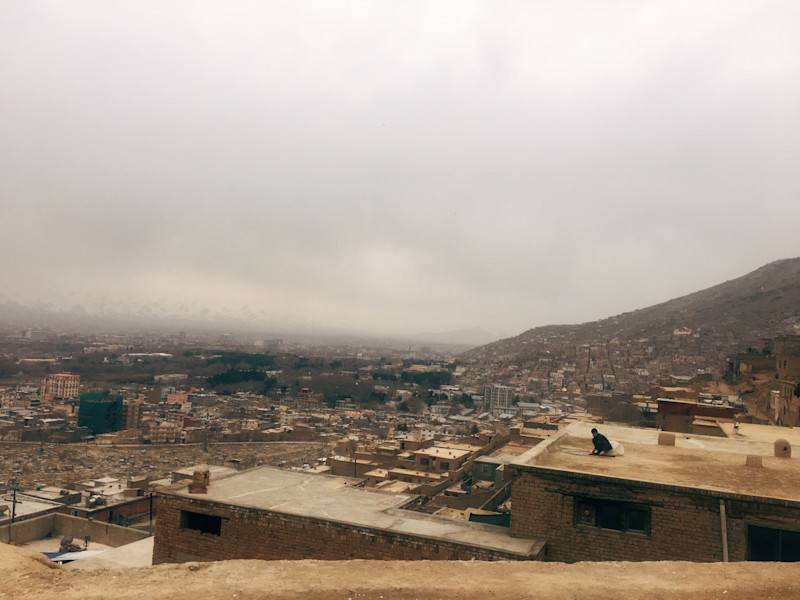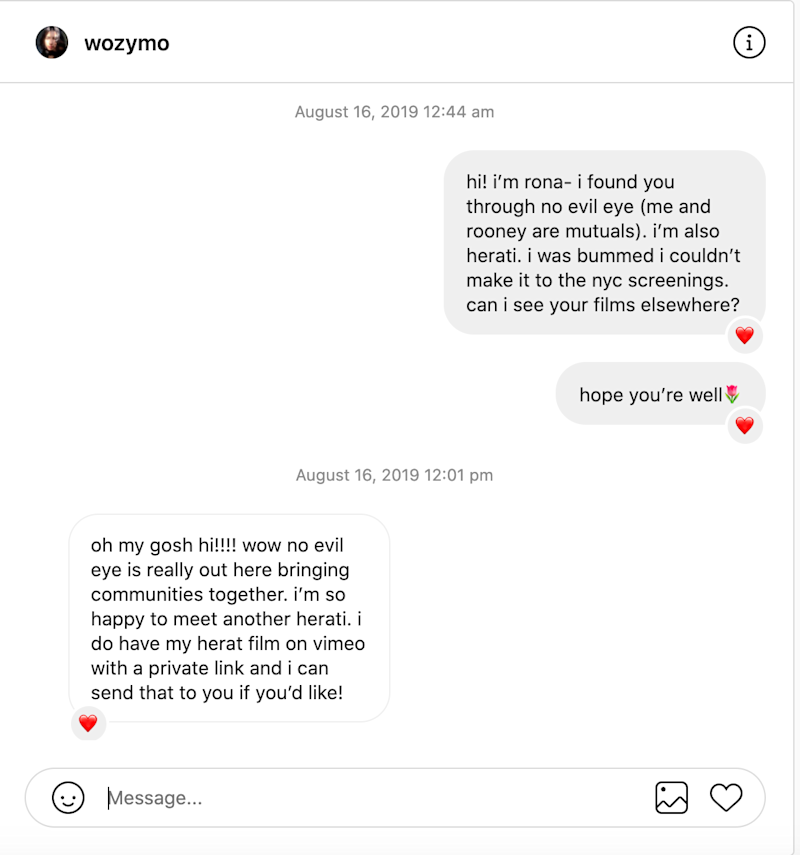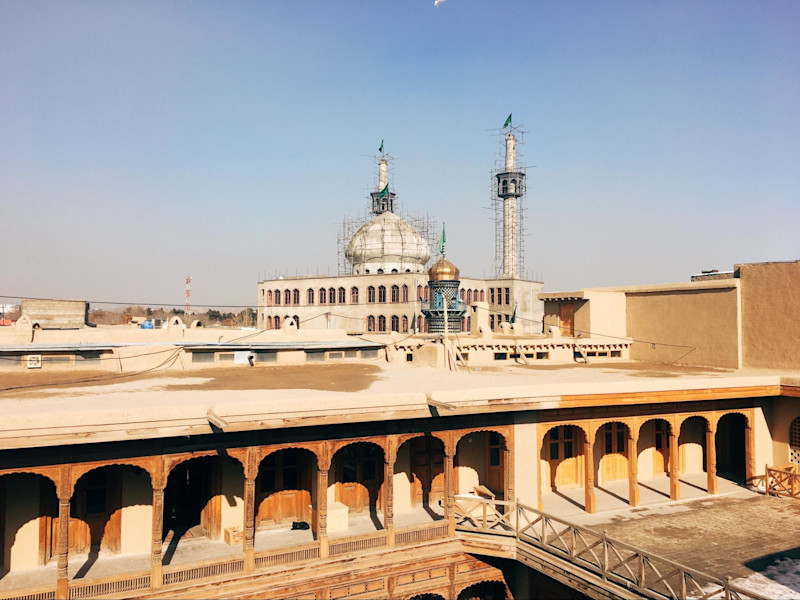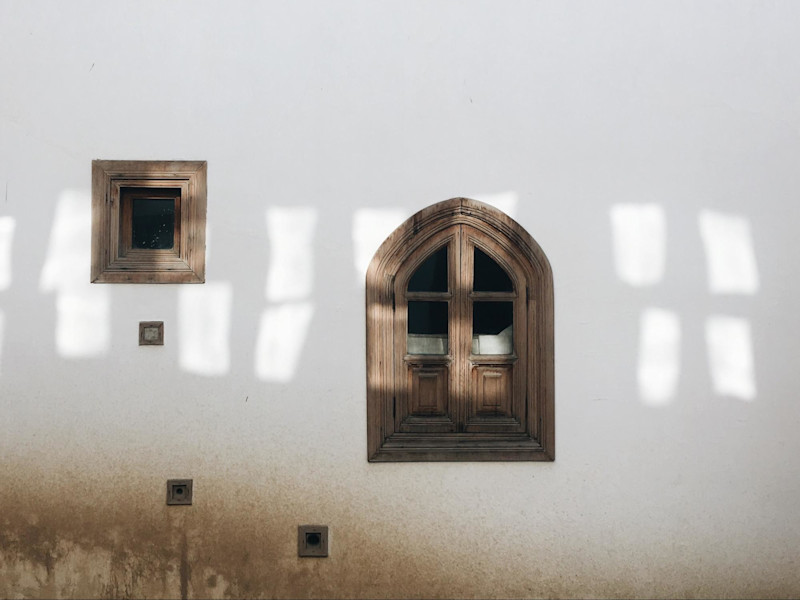Conversation
Khorasan Dreamscapes
3/31/2021
Rona Akbari and Weeda Azim

This conversation was conducted in September 2020 and appears in the Are.na Annual 2021, themed “tend.”
Weeda Azim:
Hi, how are you doing today? Ishtanee Rona jaaaaan??Rona Akbari:
Hi Weeda jaaaaan. I'm doing well. There's a lot going on work-wise and a lot on the horizon, too. Just nervous about how I'm going to balance it all.Weeda:
Anything you're excited to share out here in the ethernet? What's on the horizon? *looks out into the horizon*Rona:
Well, today Negine Jasmine (a fellow Herati filmmaker) and I released the first episode of our micropod, “Just Warm Spaces.” I've also been in this weekly writing workshop with my friend Hurley Winkler. I’m hoping I’ll be able to share some of the work I've been doing there with the world sometime. I'm also in post-production of a short film I made a while ago...there's a lot happening! But enough about me. How are you?Weeda:
Omg that sounds wild. I saw that you released a podcast and I'm super excited to listen to it!! I feel like we're living parallel lives right now, ’cause there's been a lot happening for me too. I'm a programmer at Insomniac Film Festival in Toronto, which presents a selection of films from Toronto’s distinct young film community, and the D-Day for our Insomniac The Movie: A Collaborative Quarantine Cinema Project is fast approaching! Big name, I know. Instead of holding an in-person festival, we took a more inventive approach to give filmmakers the opportunity to keep creating during such an unpredictable time. The goal is to make a feature-length film over the course of 15 weeks with 15 filmmakers, each with their own one-week slot. The catch is that you can only see the film that was shot before yours in order to continue the story. Otherwise, I've been writing some scripts...which has me thinking about all the scripts you and I could've written together if I was able to hop on a bus to America right now :-(Rona:
We will definitely write a script together one day. Also, I feel like this is a good segue to explaining how we met. I think it was a year ago that I was exploring the programming for No Evil Eye, a radical anti-colonial underground basement micro-cinema, and I stumbled on your short film Herat in my Head in my Heart. I was just kind of floored to see an Afghan name attached to a film about Afghanistan, especially Herat, which is also where my family is from. It was so exciting, I had to search you up on Instagram and DM you.
Weeda:
I was completely caught off guard! Suddenly a new world opened up and I thought to myself, “Oh, there are other Afghan diaspora out there in the film and creative industry.” Or more specifically, Afghan women. It felt especially comforting finding out that you’re Herati, too, because usually I only come across Afghans who are from Kabul. Rona:
I felt like a new world opened up, too. It seems like there are so few of us but, through the Internet and other experiences, you realize there are so many more artists in the diaspora than you would think. We’re really out here. It’s special. It feels like we’re connecting dots that were previously invisible to us. Or stitching patches back together. To me it feels impossible or maybe even morally wrong to make art and not try to seek out community with people of my shared background/heritage/lived experience. It makes art—and life—so much richer.Weeda:
Meeting you was a gateway to meeting more Afghan diaspora with similar interests, mainly on Twitter where we’re both active within the community. As a result of that exposure, I realized there are so many things about our culture and history that I have yet to learn. Through different people, I’m picking up little pieces, such as the way “how are you?” is asked differently depending on the regional dialect, and how there’s undocumented history that goes beyond the city of Kabul, but is only shared through oral storytelling. It’s exhilarating to find that there’s more than our parents’ stories, which is what I was desperately holding onto at one point. Having been born and raised in Toronto, I’ve only visited Herat twice in my life. I cherish my family’s stories, but there is much more to know and learn. My relationship with Herat is based off of my fuzzy memories as a child and pre-teen, and sometimes I don’t know if what my mind collected was even real until I pull out an old photo album and find photographs of my cousins and I playing near a river, of the green grape vines that twist around the entrance of my great aunt’s home, of me at age six with a cute hijab wearing shorts and a short-sleeved shirt—a strange fashion choice, but it all made sense at the time. Then I remember being in a taxi and seeing a boy riding a donkey on the street with heavy traffic, pointing it out to my little brother in broken Farsi, our mom hushing us, and the smug taxi driver overcharging us upon finding out that we were visitors. All the memories just flood in from there.
Rona:
Totally. Fellow Herati and poet Bobuq Sayed, who is also Australian and based in Miami, once said to me that if we were never displaced and were still in Herat we would have likely found each other as neighbors and lovers of film and art. I was born and raised in Florida and have only visited Herat as a child—my earliest memories were formed there. These friendships have reaffirmed to me that the Afghan experience is not a monolith; there are so many ethnicities, tribes, and nationalities that carry unique meanings. And the diasporic experience is no different. Like, you and I are super similar and both make films and write and have shared interests. But our upbringings are different, our families are different. You grew up in Toronto and I grew up in Florida. The stories you grew up with are so different from mine. It makes me think about how I will never be satisfied with a single version of our stories. One movie is not enough. One book series is not enough. You made me realize that we deserve a cinema. We go beyond genres. I think the work we do in our relationships is informing this for me. And that’s kind of what we’re cataloguing and moodboarding on our Are.na channel, too.
Weeda:
Our Are.na channel, khorasan dreamscapes, has been the perfect place for me to just collect photographs of all the “what-could-have-beens”—to conjure up an image or idea for myself of an Afghanistan that we never got to be a part of. Khorasan meaning “the land of the sun,” and referring to the greater Persian empire that consisted of Iran, Afghanistan, and areas of Central Asia. Herat was known as the pearl of Khorasan, but my knowledge is also quite limited, so I do romanticize a lot.Rona:
Likewise. I think that’s another reason the channel exists: To catalogue our knowledge as we expand it, add to it, and read more into our shared histories. It feels like a soft landing spot for a dialogue on reconstructing and examining the region. Weeda:
All the images that we’ve collected over the last few months make me think about how many untold stories exist out there, the ones that go beyond war and tragedy and the yellow-ish desert landscape that Hollywood seems to adore. We do deserve a cinema, one that embraces romance, drama, comedy, tragedy, all the cliches, horror and more. Why can't we have those genres? Why is the backdrop of Afghanistan always war? Our people are more than that. I know all my questions come from a place of privilege, but I feel the need to ask them anyway in order to keep myself from falling apart. If I could, I would bring world peace...but obviously I’m not capable of that, so I’ll do my part and write and make movies and hope to be a part of a movement of Afghan creatives (both diaspora and not) who are eager to show that Afghanistan is more than what they see in a war-action Hollywood movie. NEW WAVE BABY!!!!!!!!!!!!!!
Rona:
Totally. I also question the ethics of, like, is it my place to tell narratives of the motherland? As a diaspora person living in America, I’ve spent more years of my life here than in Afghanistan. I, like several other Afghans, dream of being able to tell the stories of my people. But I have uncertainty around it because I didn’t grow up in the region and my experiences are so influenced by my family’s displacement to America. But then again, maybe that is the story—the displacement. I guess I don’t have all the tools I need to really begin to interrogate that question just yet. I also wonder if this idea of a cinema can be a global, transnational canon of work instead of one that is limited to borders. There are so many hues to the experience of being Afghan, it’s not just one thing. Weeda:
I also question if it’s my place to tell the stories of our people! Sometimes I wonder if I’m inclined to tell them because it’s a way of allowing myself to explore a home that I wasn’t given a chance to be a part of. I know I need to let that way of thinking go, but there’s always going to be that underlying layer of envy. I wish our homeland wasn’t taken away from us, you know? But putting those thoughts aside, the Western audience constantly wants to see stories about the immigrant experience, and while that is valuable and important, we do have other narratives we want to share. Rona:
Exactly. What if Being Immigrant isn’t the main plot device or joke or...? What if a narrative could be about literally anything else and the characters just happen to also be immigrants. Like, when I’m watching Lady Bird, I’m not thinking, “Oh my god, what a nuanced portrayal of what it means to be a white girl living in California. This must be what it’s like to be a white girl.” No, I was just thinking, “Wow this is super relatable and funny and wonderful and kind of nuts and I can’t believe Saorsie Ronan has such a great American accent!” I feel like part of the reason that we as a diasporic community of artists have gravitated towards each other is so we can make sense of our experiences. At least for me, I’ve become obsessed with finding artists who are like me because for so long I was in Asian or South Asian organizations and spaces where there really was no one like me.

Weeda:
I’m glad that you became obsessed with finding artists like you, because if you hadn’t then I wouldn’t have ever been found. Not to be dramatic, but fate (or your persistence) really caused our paths to cross. Maybe it’s because we were manifesting similar energy into the universe, and the universe responded by bringing us together. Rona:
Absolutely. Through community, we’re able to reconstruct our heritage with our storytelling and imagery. There is room for everyone, even if institutions make us feel like we have to compete with each other as if our culture isn’t multifaceted, rich, and ancient. We get to realize this plurality of perspectives and genres and begin to create various nodes in a network for people to access them.Weeda:
I love that you said “plurality of perspectives” because as you said before, contrary to popular belief, Afghanistan is a land full of people from different ethnic groups, all with their own unique perspectives that deserve to have a voice. You and I have started to construct only a fraction of what we imagine Afghanistan to be, and of course our versions are going to be particular to our unique desires and familial history. But ultimately, through our own exploration, we can meet other Afghan diaspora who are building their part of a bigger picture. It’ll be incredible when our community comes together one day to vividly see the beauty of our culture, our people, and the country that we yearn to call home.Rona Akbari
is an Afghan writer, filmmaker, and digital media producer. She wrote and directed the short film Me and My Mesh Top, which is currently in post-production with 5th Floor Pictures. Her work has been featured in Buzzfeed, NPR, National Geographic, The Outline, and The Creative Independent. She has taught and guest lectured at Washington University, Data & Society Research Institute, and School for Poetic Computation, and her work has been included in several university curriculums.Weeda Azim
is a filmmaker based in Toronto who explores questions of cultural identity, separation, and loss in relation to the Afghan diaspora. Her award-winning short film film Herat in my Head in my Heart (2016) screened at Images Festival, Regent Park Film Festival, SAVAC's Monitor 13 program, and travelled across America with No Evil Eye. She is also a programmer at Insomniac Film Festival, a festival that aims to celebrate works emerging from the lives and experiences of young Toronto filmmakers. Are.na Blog
Learn about how people use Are.na to do work and pursue personal projects through case studies, interviews, and highlights.
See MoreYou can also get our blog posts via email